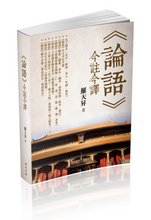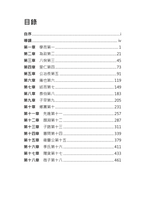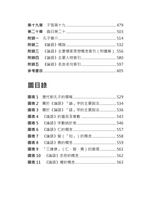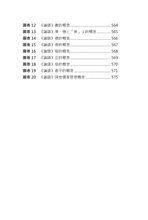
|
author |
Luo Tiansheng |
|
publishing house |
Xintian Publishing |
|
ISBN |
9789881445032 |
|
Classification |
Philosophy > Chinese Philosophy > Pre-Qin Philosophy and its Research |
|
price |
HK$188 |
|
Publication date |
August 2019 |
|
language version |
traditional Chinese |
|
Number of pages |
609 pages |
|
Edition |
first edition |
|
Binding |
Paperback/monochrome printing/14 x 21 x 3.15 cm |
|
Series / Series |
Modern annotations and translations of ancient texts |
brief introduction:
This book is the follow-up to "The Governance Wisdom of "University"" by Vincent Law (the first part of the "Becoming New with the Ancient Series") and "University. The fourth Chinese book after "The Doctrine of the Mean" and "The Management Wisdom of the Doctrine of the Mean" (the second part of the "Becoming New with the Ancient Series"). The author's "Becoming New with the Ancient Series" advocates modern people to "clear the way" (carry forward wisdom), "sharp tools" (use wisdom as an effective tool), "become new with the ancient" (learn from the experience of the past) and "be new" (innovate) ). The author is currently a senior lecturer at a university, teaching social sciences and management subjects. In recent years, he has devoted himself to the study of Chinese philosophy (especially Confucianism) and its applications, hoping to contribute to the popularization of ancient books. This book is designed to target a broad audience. The author especially hopes to arouse the interest of middle school students and college students in reading Chinese philosophy.
The Chinese nation has a history of more than five thousand years of civilization. Many ancient books have endured for a long time and contain profound wisdom. It is worthy of modern people to learn from and innovate with the attitude of "reforming the ancient as the new". As the mainstream of Chinese culture, Confucianism complements the development of modern society.
"The Analects of Confucius" is one of the "Four Books" ("The Great Learning", "The Doctrine of the Mean", "The Analects of Confucius" and "Mencius") in China. It has twenty chapters, 512 chapters, and nearly 16,000 words. It is a research Confucius is one of the most important classics on Confucius' life, thoughts, and Confucianism. There have always been numerous annotated translations of The Analects of Confucius, and there are many disagreements. The author hopes to write an annotated translation for readers that can function as a reference book. In order to facilitate readers to understand the background, metaphorical meaning and main explanation of the original text of "The Analects of Confucius", this book has re-annotated the entire text of "The Analects of Confucius" in modern plain text, and added Cantonese Pinyin and Chinese Pinyin for difficult words to facilitate reading. The author refers to the research results of experts and scholars of the past dynasties, and states some main statements in this book in order to reveal the complete appearance of "The Analects" to readers.
The Analects of Confucius is a difficult-to-read collection of quotations, written more than 2,000 years ago, which records the words and deeds of Confucius, his disciples (students) and historical figures. However, there is no obvious connection between the chapters of "The Analects of Confucius", and the content involves many historical events and figures from the Spring and Autumn Period or before. It often only describes people and events without explaining the background, which is confusing to some readers. In addition, the text of "The Analects" is concise and one word can be interpreted in many ways, so there have always been many differences among annotators and translators. This book hopes to provide readers with an in-depth understanding of the content and metaphorical meaning of "The Analects" through detailed annotations and explanations.
The Analects of Confucius is a seemingly ordinary book, but it is one of the sources of Confucian thought. "The Analects" takes benevolence as its core, based on "restraining oneself and restoring propriety" ("Yan Yuan" 12.1), and includes the principles of loyalty and forgiveness ("Li Ren" 4.15), etiquette, righteousness, filial piety, virtue, wisdom, courage, respect, respect, and justice. Concepts such as , faith, the way of a gentleman ("Gong Ye Chang" 5.16, "Zi Zhang" 19.12, etc.) and the Doctrine of the Mean ("Yong Ye" 6.29), small words contain great meaning. The wisdom of "The Analects of Confucius" is timeless and everlasting, and it has extended a lot of profound wisdom about life, conduct, management and even politics. It is worthy of modern people to appreciate it with a new perspective, and they will surely benefit a lot.
"Zhuangzi: The Master of Health Preservation" says: "My life also has a limit, and my knowledge also has no limit. It is too late to follow the limitless with the limit!" With a limited life ("you have a limit"), it is difficult for people to pursue boundless knowledge ("woundless") ”). Confucius summarized it by saying, "When I was fifteen, I was determined to learn; when I was thirty, I stood firm; when I was forty, I was not confused; when I was fifty, I understood the destiny of heaven; when I was sixty, my ears were obedient; when I was seventy, I followed my heart's desires without exceeding the rules" ("Wei Zheng" 2.4). The life journey of being determined to learn, establishing oneself, not being confused, knowing destiny, being obedient, and finally doing what one wants. I hope that readers will not only understand the content of "The Analects", but also think deeply about life issues such as learning, determination, knowing destiny, and following one's heart's desires, so as to know how to advance and retreat in an increasingly complex and changing environment.
About the Author:
Vincent Law holds a PhD in Business Administration from the Hong Kong Polytechnic University, an MBA (with distinction) from City University of Hong Kong and a Bachelor of Science from the University of Hong Kong. He has worked in administrative management in private companies for a long time, and later joined a think tank to engage in public policy research. He is currently a senior lecturer at the School of Professional and Continuing Education at the Hong Kong Polytechnic University, teaching social science and management subjects. He has participated in a number of research projects in the fields of public policy, public participation and education. In 2015, he began to write the "New Series with the Past". His Chinese works include "The Governance Wisdom of "University"" and "University. "The Doctrine of the Mean" and "The Management Wisdom of the Doctrine of the Mean".
Table of contents:
Preface Chapter 1: Learning, Chapter 1, Chapter 2: Government, Chapter 3, Eighteen Third, Chapter 4, Li Ren, Chapter 4, Fifth, Gongye Chang, Chapter 5, Sixth, Chapter 6, Yong Ye, Chapter 7, Chapter 7 Chapter 8 Taibo Chapter 89 Zihan Chapter 90 Township Party Chapter 11 Advanced Chapter 1112 Yan Yuan Chapter 12 Chapter 13 Zi Lu Chapter 13 Chapter 14 Xian Wen Chapter 14 Chapter 15 Duke Linggong of Wei Chapter 15 Chapter 16 Ji Family Chapter 16 Chapter 17 Yang Huo Chapter 17 Chapter 18 Wei Zi Chapter 19 Chapter 10 Zi Zhang 9 Chapter 20 Yao said Chapter 20 Appendix 1 Introduction to Confucius Appendix 2 Overview of "The Analects" Appendix 3 Index of main Confucian concepts in "The Analects" (with illustrations)
Appendix 4: Index of Main Characters in "The Analects of Confucius" Appendix 5: Index of Famous Quotes in "The Analects of Confucius" Bibliography







